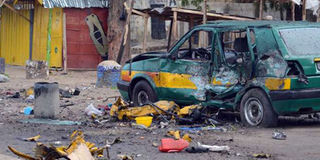US contemplates expanding military presence in Africa

The wreckage of a vehicle that suffered a blast at Gomboru market in Maiduguri, Borno State in northeastern Nigeria on July 31, 2015. Countries like Senegal have problems with terrorism but not on the same scale as Boko Haram or Al-Shabaab. But reliance on a single base in Djibouti seems less certain. PHOTO | AFP
What you need to know:
- Washington has told Americans that the Islamic State may target them in malls and hotels in South Africa, but no one should expect marines parachuting into Johannesburg.
- One can debate whether Ebola gave the US a new perception on the continent or served as a cover. During natural disasters, the US has always been generous with aid.
Growing alarm over terror threats in Africa may see the US expand its military presence across the continent. Washington has 50 diplomatic missions in Africa, more than any other country.
But while US diplomats may straddle the continent, most of the superpower’s focus has been on defence.
Washington has told Americans that the Islamic State may target them in malls and hotels in South Africa, but no one should expect marines parachuting into Johannesburg.
Since 1998 when Al-Qaeda bombed American embassies in Nairobi and Dar es Salaam, attention has been mainly on Kenya and to a lesser degree Uganda.
And, after 9/11, the US set up a military base in Djibouti.
Then the Ebola epidemic struck in 2014. Army and medical personnel found themselves in west Africa, containing a deadly outbreak.
At the signing of a defence deal with Senegal in May, US ambassador Jim Zumwalt explained how the epidemic “led to bigger things”.
“During the Ebola crisis both governments recognised that our security relationship had grown, and we needed a stronger legal framework to work together,” he said.
One can debate whether Ebola gave the US a new perception on the continent or served as a cover. During natural disasters, the US has always been generous with aid.
West Africa has long been viewed as a problem. Senegal’s neighbour Guinea Bissau is regarded as a “narco-state” where drugs destined for Europe and the US are stored.
Concern has also been raised about lack of progress in defeating Boko Haram Islamists in Nigeria, Chad, Niger and Cameroon where the US has some troops.
By contrast, Djibouti has been a blessing. President Ismaïl Guelleh has no time for radical Islam and, from his soil, the Pentagon has run operations across the region.
But there are signs that the love affair with Washington may be headed for rough times. Last year, Guelleh forced the US out of one of the bases and handed the site to the Chinese navy.
Unfortunately, the 69-year-old makes regular visits to Paris for treatment, adding worries about the future.
WIDENING ITS REACH
In December, Djibouti police opened fire on protesters, and a State Department rights report noted “harsh prison conditions, arbitrary arrests and denial of fair trials”.
The report said Guelleh’s government engaged in “unlawful deprivation of life” or killings in simple terms.
Dependence on the goodwill of an increasingly erratic president can make it difficult to speak one’s mind.
Djibouti and Uganda are members of the International Criminal Court and, like Kenya, have a duty to arrest Sudan’s leader Omar al-Bashir who is facing crimes against humanity charges.
When Bashir attended President Yoweri Museveni’s swearing-in ceremony in Kampala last month, the US ambassador walked out. Museveni described the ICC as a “bunch of useless people”.
Yet, there was no such pique a few days earlier when the Sudanese leader sat in the same room with the US delegation attending a similar event for Guelleh.
The headquarters of US Africa Command (Africom) is based in Stuttgart, Germany, and maintains a low profile but is known to have “drone capacity”.
While President Obama’s rhetoric is softer than George Bush’s, the defence budget is higher than during the Vietnam War.
Countries like Senegal have problems with terrorism but not on the same scale as Boko Haram or Al-Shabaab. But reliance on a single base in Djibouti seems less certain.
Africom sources say the US is looking for options in nine other countries.
Africa has, at last, become a priority, and judging by the deal with Senegal, Washington is spreading its bets.




